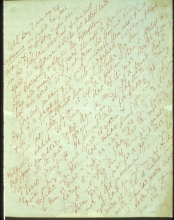Page 1
Well, say I am an ignoramus in your English ways, and I'll say you are one in our Tibetan customs and we will split the difference and shake our astral hands over Barnang and square the discussion.
The old woman? Of course she will be frantic — but who cares? It's kept from her however secret. No use making her more miserable than what she is. Cook is a pump of filth, with perpetually working pistons and the sooner he screws them up — the better for him. Your last letter to me is less a "petition" than a protest, my respected Sahib. It's voice is that of the war sankh of my Rajput ancestors, rather than the cooing of a friend. And I like it all the more I promise you. It has the right ring of honest frankness. So let us talk — for sharp as your voice may be, your heart is warm and you end by saying "Whether you decree that what seems to me right be done or not" you are ever ours faithfully etc. Europe is a large place but the world is bigger yet. The sun of Theosophy must shine for all, not for a part. There is more of this movement than you have yet had an inkling of, and the work of the T.S. is linked in with similar work that is secretly going on in all



Barnang is the Tibetan term for Ākāśa.
Sahib means "friend" in Arabic and was commonly used in the Indian Sub-continent as a courteous term in the way that "Mr." and "Mrs." are used in the English language.
War sankh (or shankh), refers to a sacred instrument made of a conch shell that serves to purify the environment. It signals the beginning and end of each day of warfare.